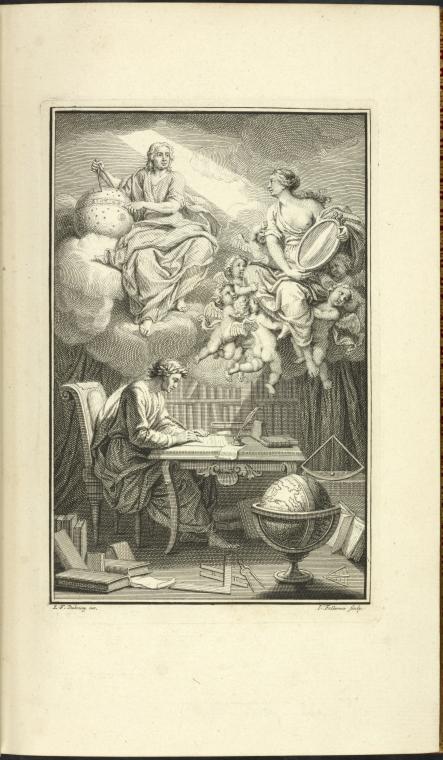Women's History Month
Madame du Châtelet and Fighting the Invincible Force
When we seek to recognize and champion women in history, often we must look for the echoes of their presence. Barred by expectation or explicit prohibition from many outlets for expression and renown, they worked within the constraints of their time, often relying on their male peers to promulgate their thoughts or introduce them into literary and intellectual society. This phenomenon is perhaps not as historic as we might hope, as author Siri Hustvedt explored in her most recent novel The Blazing World (itself a reference to Margaret Cavendish’s seventeenth century utopian work).

Madame Gabrielle Emilie le Tonnelier de Breteuil, Marquise du Châtelet, was a French noblewoman of the Enlightenment who, as Liz Lemon might say, “had it all.” She came from a wealthy family, married into a position of prominence, raised several children, and studied math, science, religion, and politics as a member of the Republic of Letters. However, in her native France, the Academy of Sciences, universities, and many intellectual gatherings excluded women. She was forced to pursue a path of independent study, bringing tutors and books to her home at Cirey. Today, she is known primarily through her relationships to famous men: translator of Isaac Newton and Bernard Mandeville, student of Pierre-Louis Moreau de Maupertuis and Alexis Clairaut, and lover and intellectual companion of Voltaire. In the Rare Book Division, Madame du Châtelet’s voice is preserved within our extensive collection of Voltaire material.
Madame du Châtelet’s translation of Isaac Newton’s Principia is usually held to be her greatest scholarly accomplishment. In this period, a translation was a powerful thing, as it furthered the diffusion of new ideas and fostered widespread collaboration in the arts and sciences. Du Châtelet had an enviable command of language, speaking French, Latin, Italian, and English—Voltaire claimed she learned the latter in only fifteen days. For her work with the Principia, du Châtelet did not limit herself to a word-for-word translation, but added commentary that explained, clarified, and improved upon the original text. Voltaire relied on her collaboration and thorough understanding of Newton’s ideas while composing his Elémens de la philosophie de Neuton (Elements of Newton’s Philosophy). He reserved the dedication and introduction of the book to praise du Châtelet’s efforts in both poem and prose. The introduction (translated here in the English edition, also published in 1738) begins:
“Your solid Study of many new Truths, and the Fruits of so meritorious an Application, are what I now offer the Publick for your own, and the Glory of your Sex, and for the Improvement of all such as desire to cultivate their Reason, and enjoy without difficulty the Benefit of your Enquiries.”
NYPL also holds a letter written by Voltaire to his niece Marie-Louise Mignot, wherein he describes his relationship with Madame du Châtelet and her husband the Marquis. The du Châtelets’ marriage was motivated by social and business concerns: the merging of two powerful families. The Marquis was aware and tolerant of the relationship between his wife and Voltaire; Voltaire lived in the couple’s house at Cirey for several years. NYPL’s letter was written over three years into his residency, in December 1737.
“As long as I live,” he writes, “I live beside Madame du Châtelet, whose friendship for me merits the greatest sacrifice. Gratitude alone should tie me to her forever, and gratitude is not the only feeling that I have. The Marquis du Châtelet has the same goodness as his wife, who honors me. I have lived with her in a liaison of intimacy, of sweetness, of trust that for five years has weathered any storm.”
Both Madame du Châtelet and Voltaire would eventually assume new liaisons: du Châtelet with the poet and soldier Jean-François de Saint-Lambert and Voltaire with the same niece to whom he wrote the 1737 letter.
Madame du Châtelet’s intelligence and social rank helped her rise to prominence in a male-dominated society, but she was critical of the institutional limitations that denied such opportunities to women as a whole. She used the preface of another translation, Bernard Mandeville’s The Fable of the Bees, to criticize the lack of educational opportunities for women:
“Why do these creatures whose understanding appears in all things equal to that of men, seem, for all that, to be stopped by an invincible force on this side of a barrier; let someone give me some explanation, if there is one. I leave it to naturalists to find a physical explanation, but until that happens, women will be entitled to protest against their education. As for me, I confess that if I were king I would wish to make this scientific experiment. I would reform an abuse that cuts out, so to speak, half of humanity. I would allow women to share in all the rights of humanity, and most of all those of the mind.”
Merci, Madame.
To learn more about Madame du Châtelet’s life, try Judith Zinsser’s La Dame D'esprit: A Biography of the Marquise du Châtelet. You can also read a collection of her scientific, philosophical, and religious writings in translation.
Read E-Books with SimplyE
 With your library card, it's easier than ever to choose from more than 300,000 e-books on SimplyE, The New York Public Library's free e-reader app. Gain access to digital resources for all ages, including e-books, audiobooks, databases, and more.
With your library card, it's easier than ever to choose from more than 300,000 e-books on SimplyE, The New York Public Library's free e-reader app. Gain access to digital resources for all ages, including e-books, audiobooks, databases, and more.
If you don’t have an NYPL library card, New York State residents can apply for a digital card online or through SimplyE (available on the App Store or Google Play).
Need more help? Read our guide to using SimplyE.
